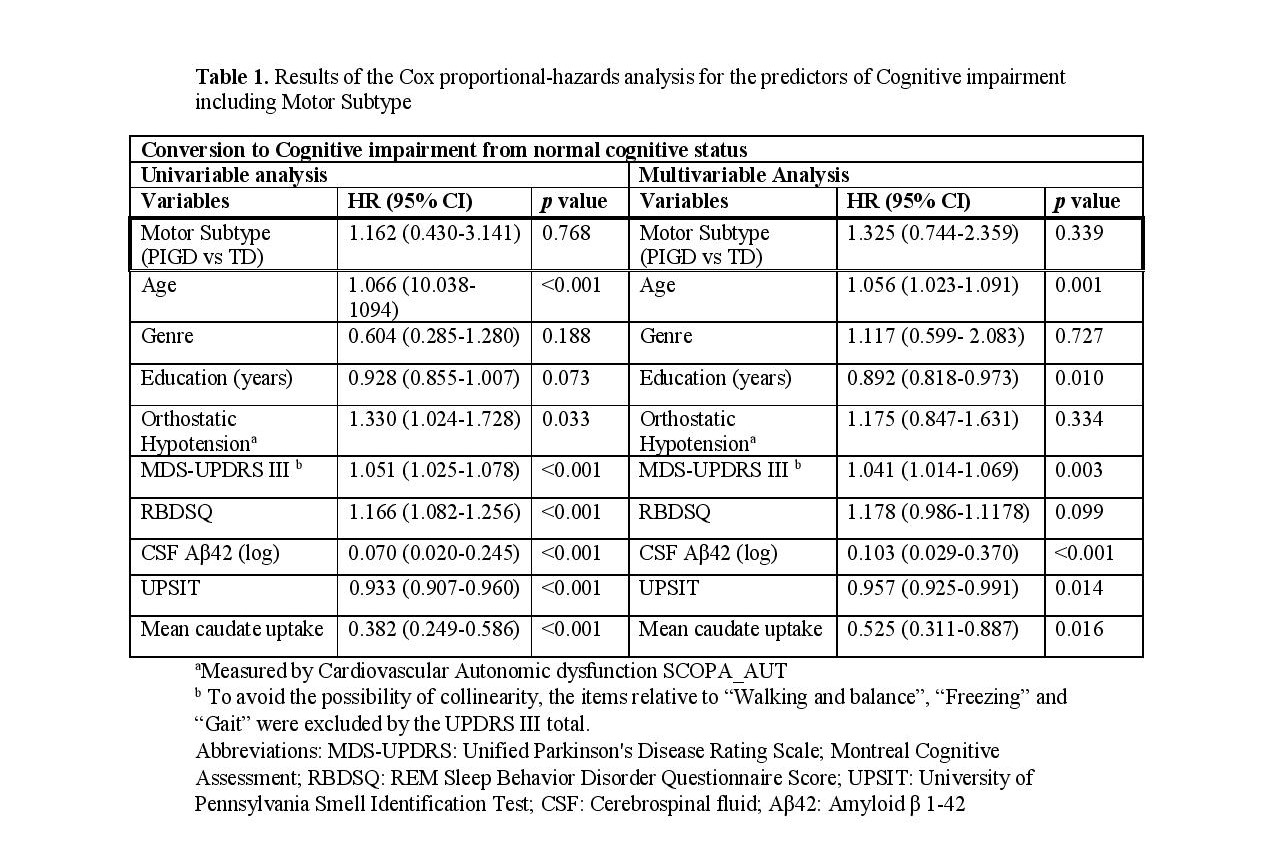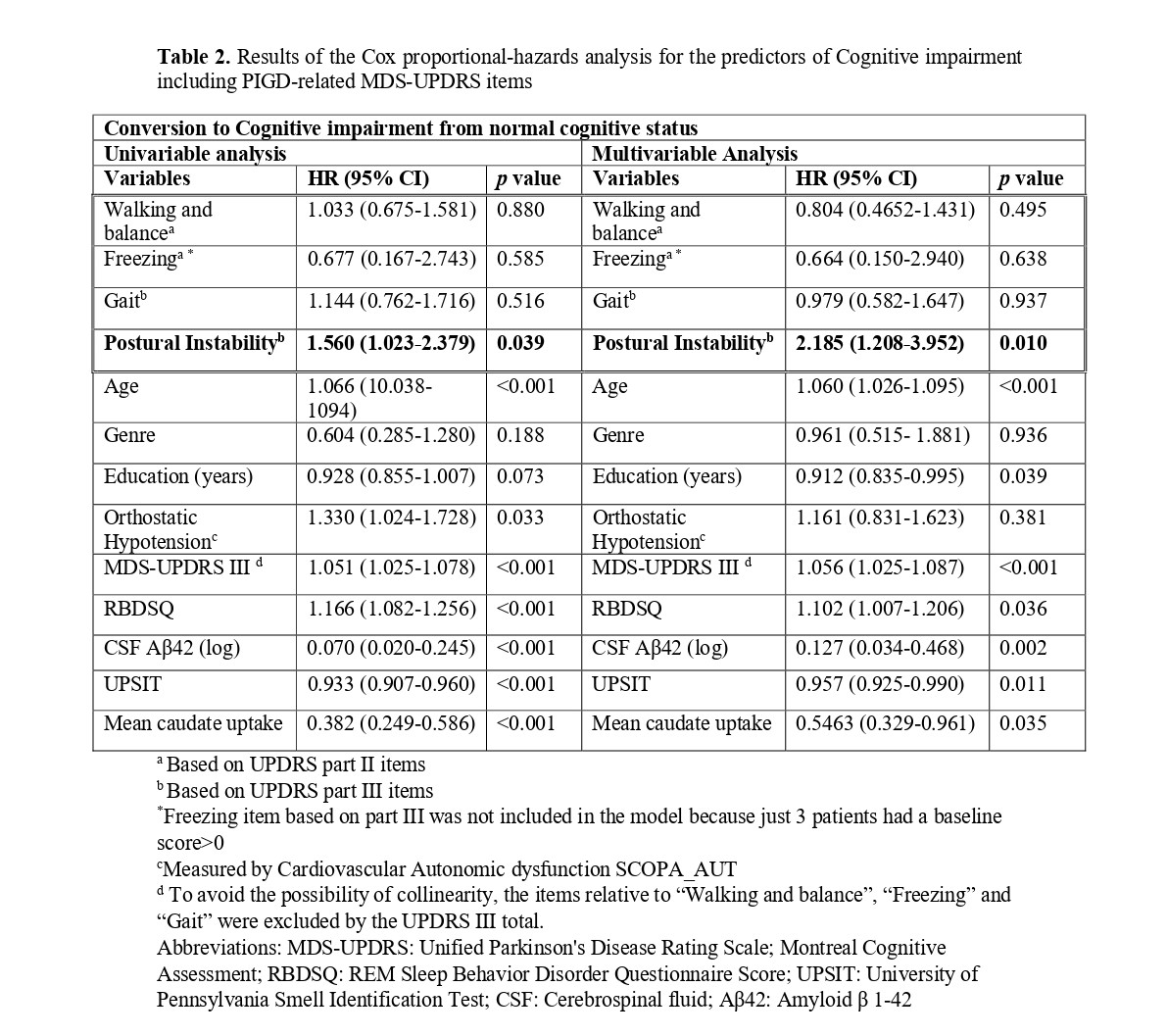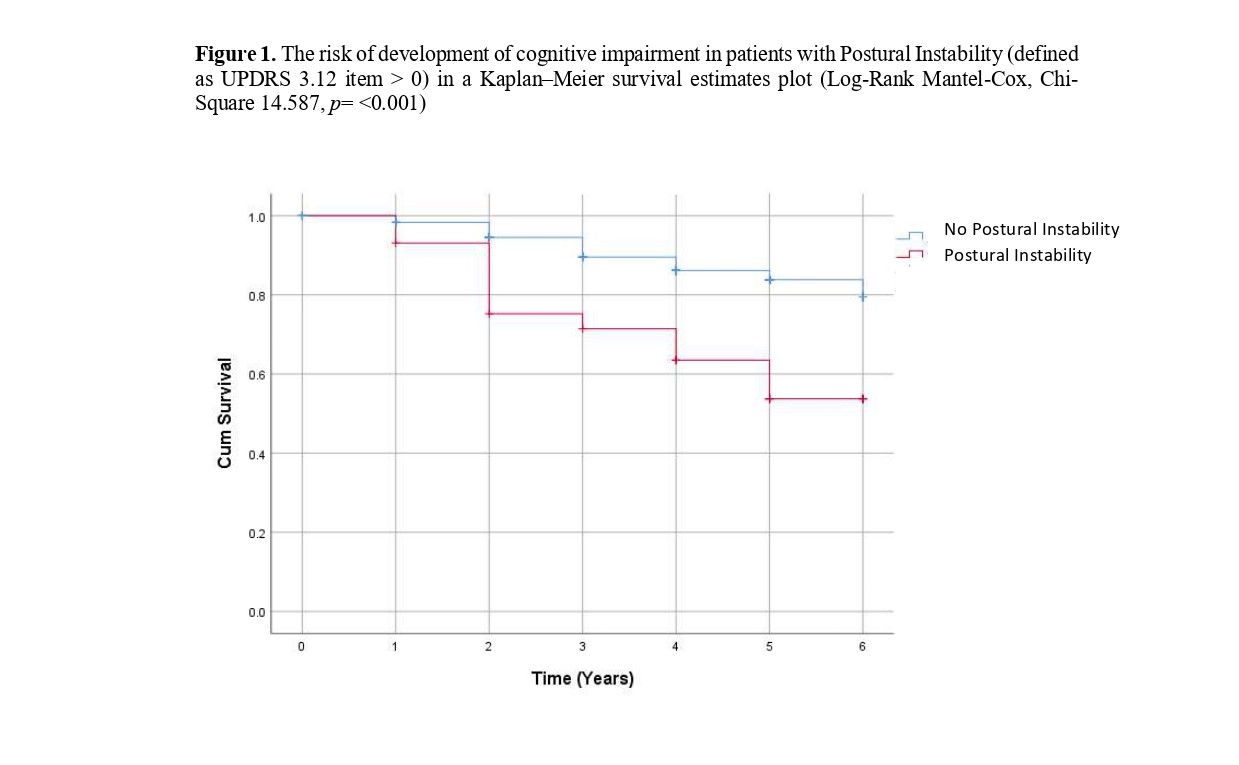Category: Parkinson's Disease: Cognitive functions
Objective: To investigate whether postural instability/gait difficulties (PIGD) phenotype classification or specific PIGD-related MDS-UPDRS items may predict cognitive impairment in de novo Parkinson’s disease (PD) patients.
Background: PIGD phenotype has been associated with worse cognition in PD.1 However, classifying PD into PIGD and tremor dominant (TD) subtypes may have several limitations, such as diagnostic inconsistency.2
Method: Data on de novo PD patients were obtained from Parkinson’s Progression Markers Initiative (PPMI) (N=423) databases. Motor subtype (TD versus PIGD) was defined based on the formula published by Stebbins using the relevant MDS-UPDRS items.3 At follow-up (up to 6 years) patients were categorized as having normal cognition or cognitive impairment (defined as either mild cognitive impairment or dementia), according to the PPMI protocol.4 Multivariate Cox survival analysis was carried out including motor subtype or singular MDS-UPDRS items defining PIGD phenotype3: Walking-Balance and Freezing (Part II), and Gait, Freezing of Gait and Postural Instability (Part III). Previously validated clinical predictors of cognitive impairment and orthostatic hypotension were included in the model as covariates. Occurrence of cognitive impairment at follow-up was used as the time-to-event.
Results: At baseline, 76 (18.2%) patients were classified as PIGD, 299 (70.7%) TD and 47 (11.1%) as indeterminate. During a median follow-up of 5 years, 71 patients developed cognitive impairment. Conversion to cognitive impairment from normal cognition was not associated with the motor subtype (TD versus PIDG score; hazard ratio [HR] 1.325; confidence interval [CI] 0.744-2.359; p=0.339, Table 1). When individual MDS-UPDRS items were interrogated in the model, Postural Instability proved to be an independent predictor of cognitive impairment conversion (HR 2.185; 95% CI 1.208-3.952; p=0.010, Table 2, Figure 1). Conversely, gait difficulties (HR 0.979; 95% CI 0.582-1.647; p=0.937) were not a predictor of changes in cognition
Conclusion: Our findings support that the classical motor subtyping of PD may not be appropriate for the prediction of cognitive impairment, and suggest that postural instability, as assessed by MDS-UPDRS III, may serve as a possible indicator of the risk of developing cognitive impairment in de novo PD patients.
References: 1. Burn DJ, Rowan EN, Allan LM, Molloy S, O’Brien JT, McKeith IG. Motor subtype and cognitive decline in Parkinson’s disease, Parkinson’s disease with dementia, and dementia with Lewy bodies. J Neurol Neurosurg Psychiatry. 2006;77:585–89. 2. Lee JW, Song YS, Kim H, Ku BD, Lee WW. Alteration of Tremor Dominant and Postural Instability Gait Difficulty Subtypes During the Progression of Parkinson’s Disease: Analysis of the PPMI Cohort. Frontiers in Neurology 2019; 10. 3. Stebbins GT, Goetz CG, Burn DJ, Jankovic J, Khoo TK, Tilley BC. How to identify tremor dominant and postural instability/gait difficulty groups with the movement disorder society unified Parkinson’s disease rating scale: comparison with the unified Parkinson’s disease rating scale. Mov Disord. (2013) 28:668–70. 4. Parkinson Progression Marker Initiative. The Parkinson Progression Marker Initiative (PPMI). Prog Neurobiol 2011; 95: 629–35.
To cite this abstract in AMA style:
D. Urso, V. Leta, L. Batzu, T. Yousaf, C. Farrell, D. van Wamelen, R. Chaudhuri. Disentangling postural instability-gait difficulties classification model for the prediction of cognitive impairment in de novo Parkinson’s Disease patients [abstract]. Mov Disord. 2020; 35 (suppl 1). https://www.mdsabstracts.org/abstract/disentangling-postural-instability-gait-difficulties-classification-model-for-the-prediction-of-cognitive-impairment-in-de-novo-parkinsons-disease-patients/. Accessed April 26, 2025.« Back to MDS Virtual Congress 2020
MDS Abstracts - https://www.mdsabstracts.org/abstract/disentangling-postural-instability-gait-difficulties-classification-model-for-the-prediction-of-cognitive-impairment-in-de-novo-parkinsons-disease-patients/



